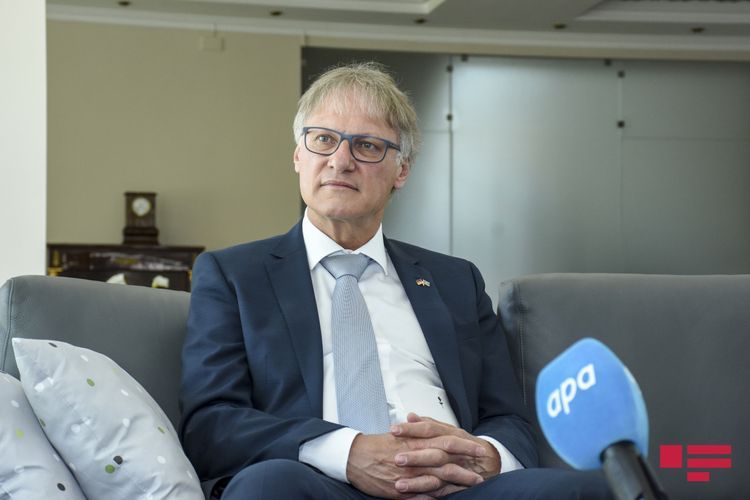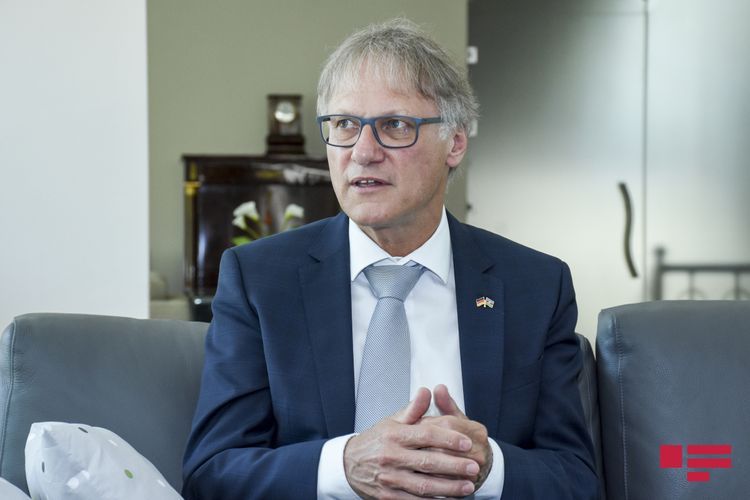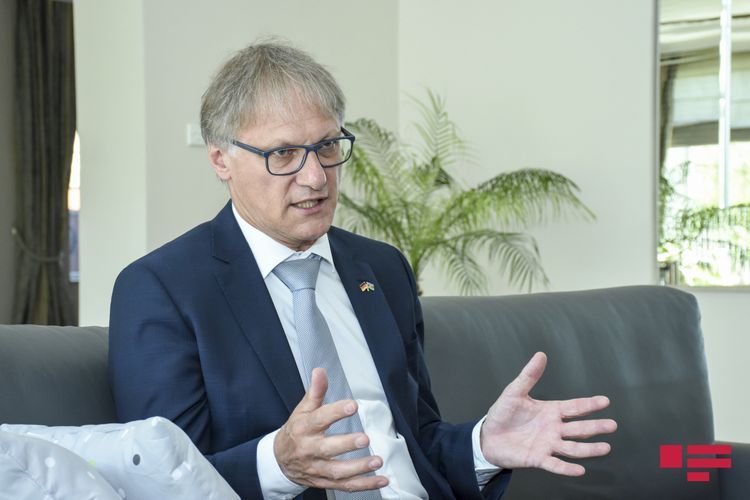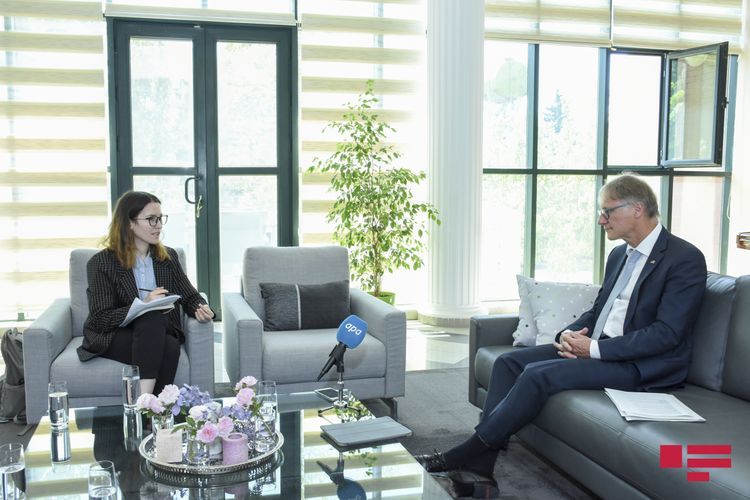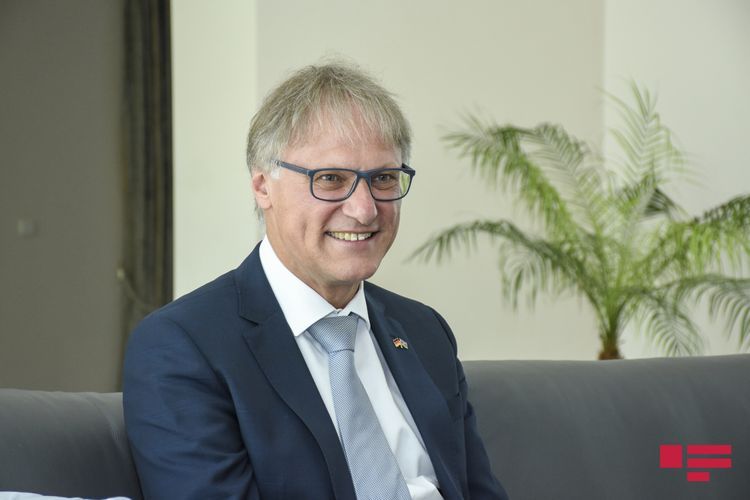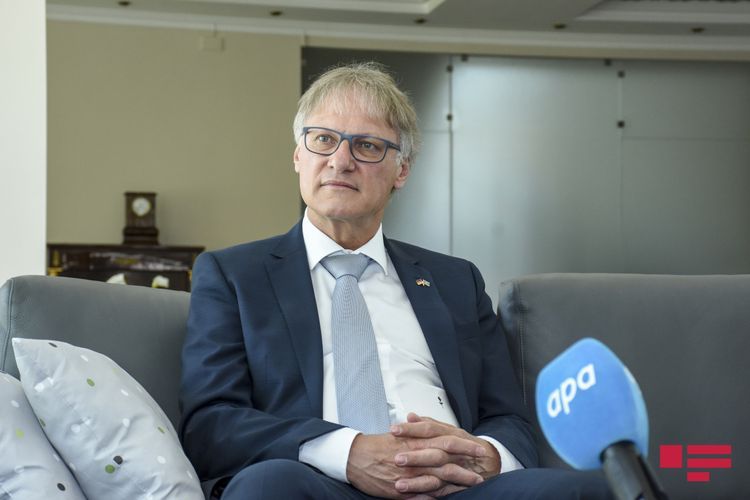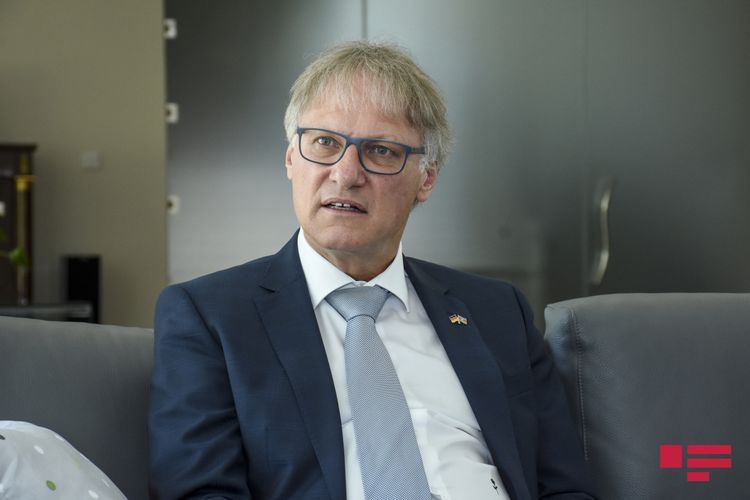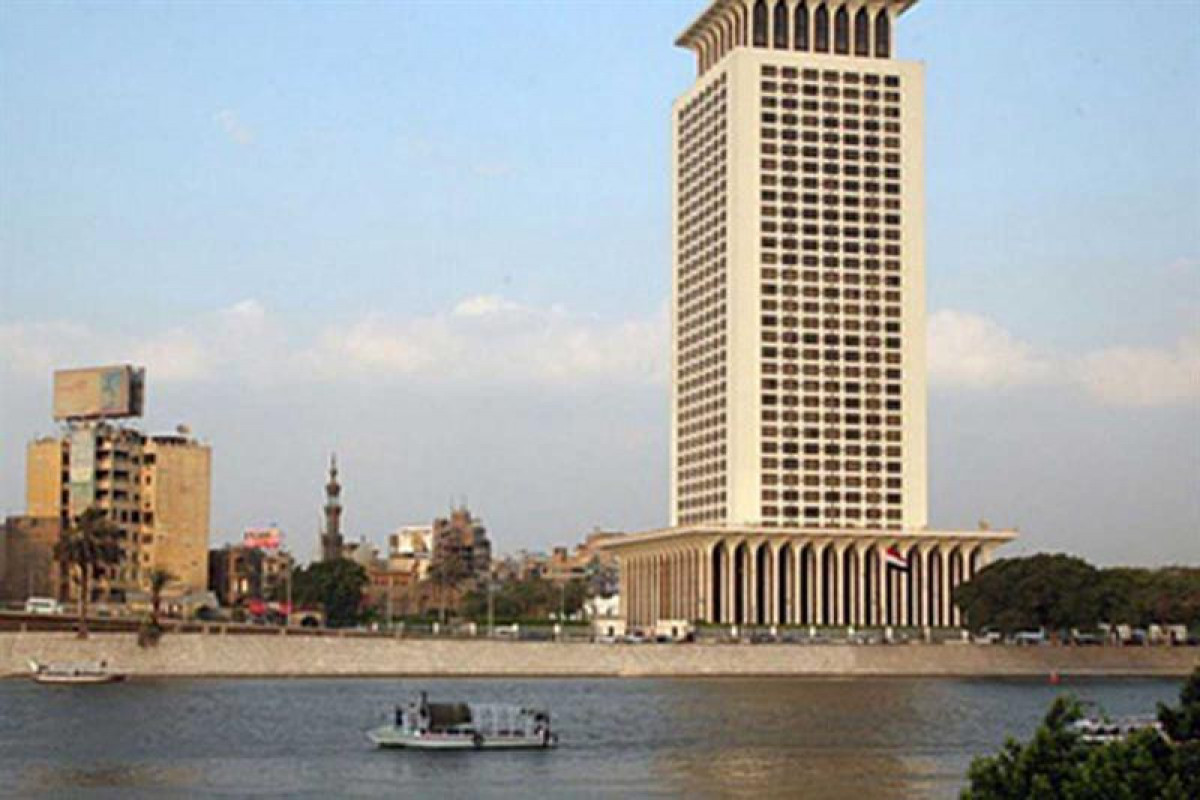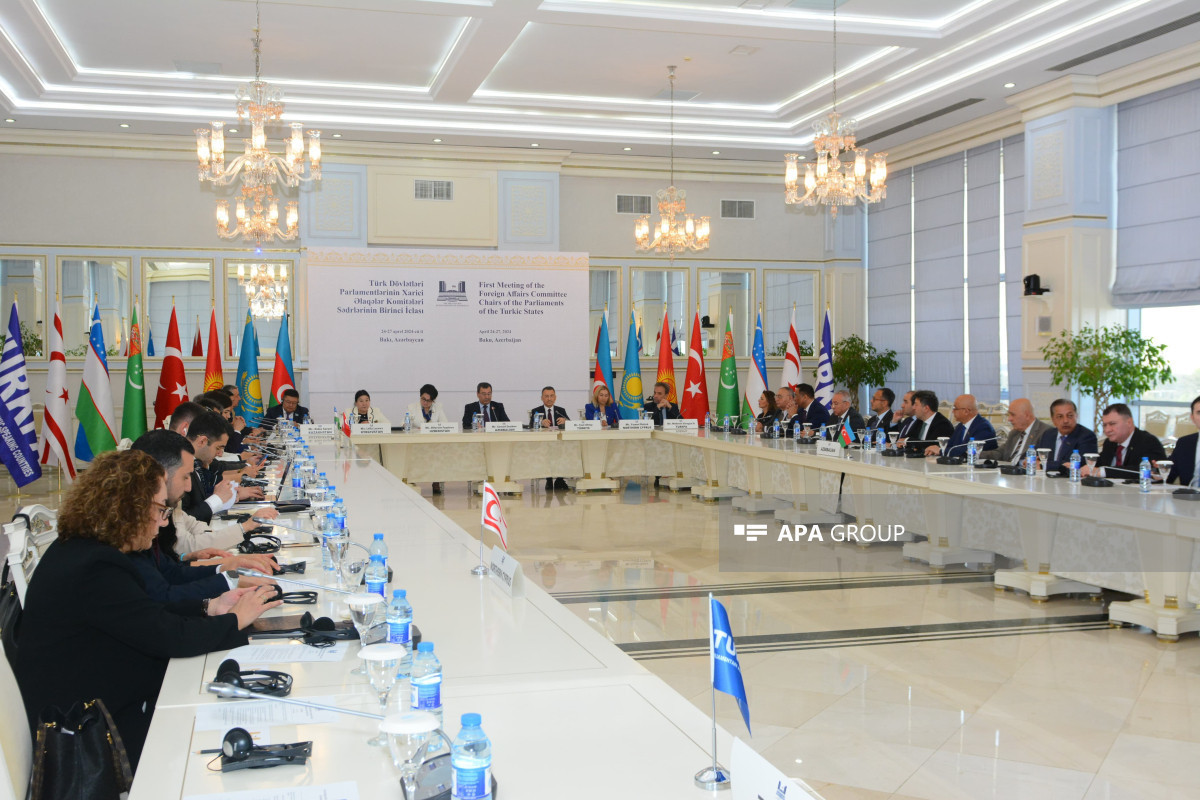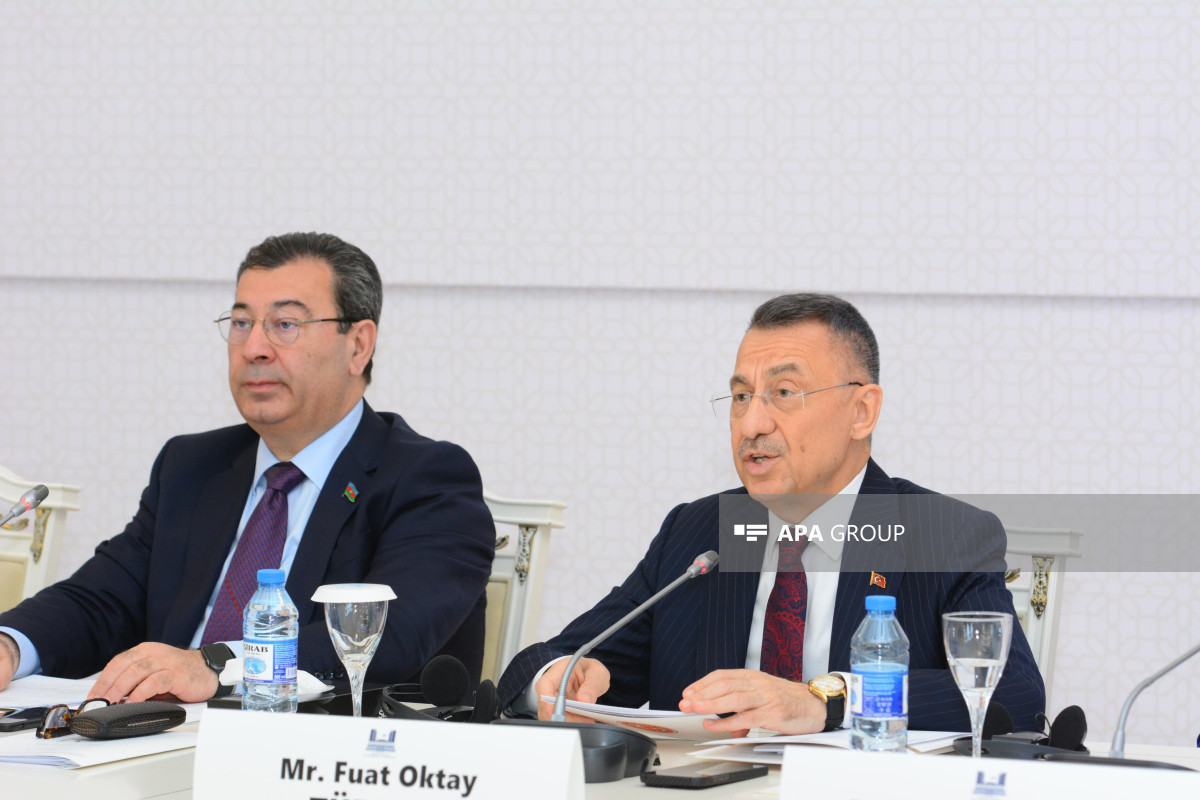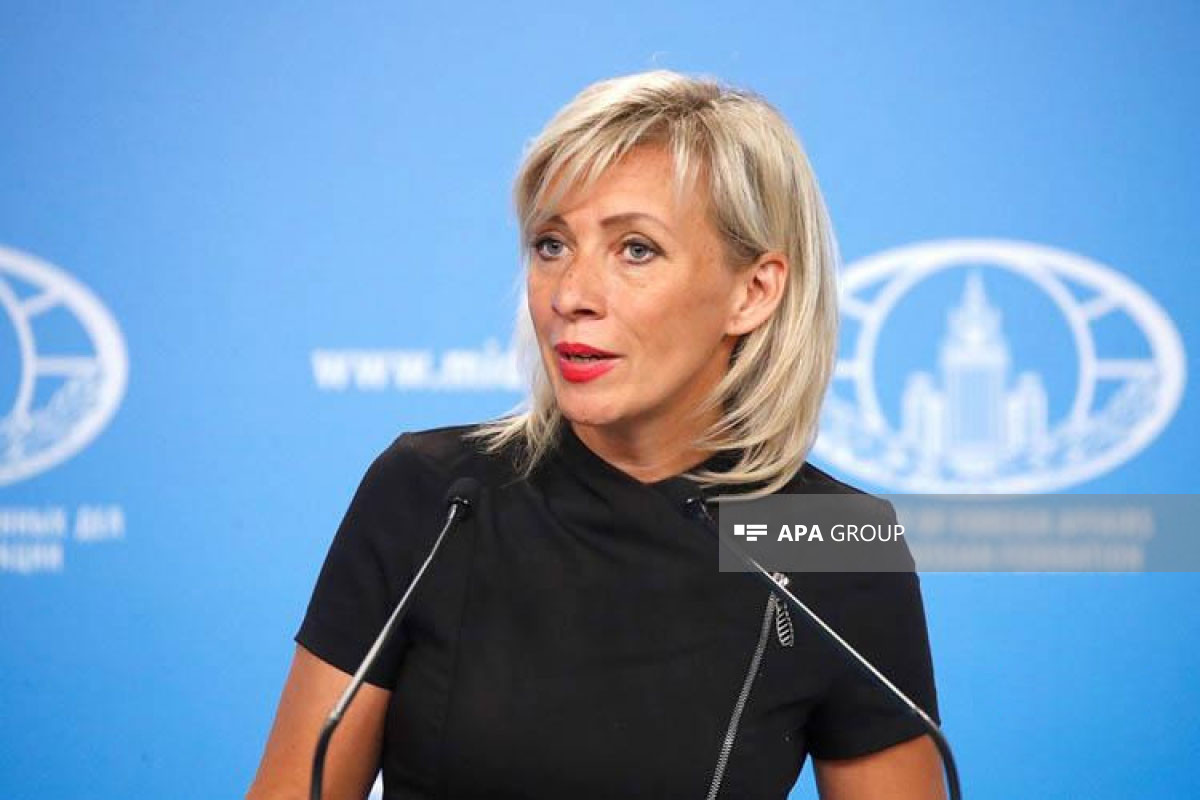Interview with APA of Germany’s ambassador to Azerbaijan Wolfgang
- I would like to ask about a topic what, in these days, has stolen all agendas of countries - COVID-19 pandemic. So far, Germany in Europe is one of the few that has been managed successfully the situation. What is the secret of Germany’s success to deal with the situation?
- First of all, I would like to emphasize the cooperation between Germany and Azerbaijan. Germany is not heavily affected by the numbers of victims of the COVID -19 virus; but it is also a country that takes obligations and responsibility in a very serious manner. So far, we have, at an early stage, cooperated with many countries, including Azerbaijan. We are also very grateful for the solidarity expressed by Azerbaijan. I just want to remind the illumination of the Heydar Aliyev Center with the German flag. This had been a very nice and kind gesture of Azerbaijan.
We are also very grateful to the government for the support of the evacuation of German citizens here at a very early stage of the crisis. On the 17th of March, we had arranged an evacuation plane for a German Girls choir from Hamburg. Together with Azerbaijan, we had made the evacuation possible in a very easy manner. Some days ago, a plane had been organized by the Azerbaijani government for Azerbaijanis with a German resident permit. Thus, we got the chance to bring members of the German community, including staff from my embassy, back to Germany. Some other colleagues came back from Germany to Azerbaijan with this flight. We are very grateful for this interaction.
As far as your question is concerned: Firstly, I guess we had acted very early in Germany on one hand; on the other hand, the first visible infections in Europe were registered in northern Italy, not in Germany. I do not know what would have happened if we had been the first target country of the virus. Therefore, we had some time to prepare. This was certainly one of the most important advantages for Germany. The decisions taken both by the Federal government and by the governments of the German States on the first priorities led to the implementation of strict health policy and of the prevention of the disease. The coordination between the Federation and the States was very effective. We could manage the restrictive measures which we have imposed. Secondly, it is to be mentioned that the Germans were very responsible, behaved properly, they observed the recommendations and restrictions. And of course, some regulations and legal texts had been adopted at the beginning. There were a lot of recommendations issued by our federal agencies for health, for instance, the famous “Robert Koch Institute”. And the Chancellor, Ms. Angela Merkel, hold a press conference every day. Everybody knew that there is something serious going on with the spread of the virus. The communication by the experts and reinforced by the government had been decisive. I guess all these factors combined played a role that the repercussions of the disease were not so dramatic in Germany. On the other hand, the German health system is - unlike some others in Europe - not totally under the dictate of economic constraints. We still have a covering public health system which is publicly financed. In some other countries, health is privatized and the public health system is underfinanced. Private hospitals are well equipped but not open to the broader population. Nevertheless one of the lessons we learned: We can say that health is a public good and not something to make money. I am of the opinion that the combination of good communication and a reasonably financed public health sector is the background of the current satisfactory situation in Germany.
- As we know that measures also taken considering the situation of reproduction rate. Experts and officials said that it would be taken all necessary safety measures in order to keep the reproduction rate below one. But recently Robert Koch Institute announced that there is a slight increase in reproduction rate which is dangerous and could bring the second wave. So can we expect any kind of quarantine measures in the near future?
- The reproduction rate is not the only indicator triggering restrictive measures; it is only one of the triggers. Looking back to the last weeks we see what happened: Not only the calculated total number of new cases is important. Instead, new infections were detected in slaughterhouses. We have more cases there due to the bad living conditions of the workers. Many people share narrow rooms. These findings have now also political consequences for the whole meat production sector. Finally, we need a lot of information. The German States are obliged to take care of the issue. The Prime Ministers of the German States and the Chancellor decided together that restrictive measures could be and should be taken when the figure of newly detected infections exceeds 50 cases per 100,000 inhabitants of a district or town within one week. This decision has been contested by the City government of Berlin because the figure may be too high for the densely populated Berlin, but it may be fine for districts in the countryside with a lower population density. Finally, the administrations are allowed to decide with more flexibility on how to react on further restrictions, depending on the circumstances of the detection of an increase in numbers. If the increase is concentrated at certain localities like meat production factories and if it does not affect the whole State, targeted restrictions have to be imposed on a district or town only but not on the whole State. Thus, we can act very flexible and in my view, the transfer of decision making competence on the State and regional level is also a special strength of the German federal system. Some people complained that this federal system seemed to be too clumsy at the beginning of the pandemic; but after having general coordination of the issue on the federal level, we returned to the principle of responsibility of the States and municipalities. But of course, Germany is much bigger than Azerbaijan and our experience which is traditionally accepted by the Germans must not be transferred to other countries where it may not be acceptable. But the German example also testifies that democratic and liberal systems can deal with a crisis with impressive results.
- Some political experts say that the crisis showed how the EU is fragile and it will have a divisive effect. What is your view?
- I do not agree with the perception that the European Union (EU) is weak. The EU has taken very strong measures in the crisis. The Member States, like Germany, have mutually offered assistance and helped Italy, Spain, France and the UK - which is still semi-member until the end of this year. The activities and solidarity among the Member States of the EU are very strong. Although at the beginning of the crisis some measures like the closing of borders did not seem very well coordinated. But each government was suddenly confronted with the crisis and had to react immediately. But even under these circumstances, it only took a few days until the EU and the Member States formulated a common policy. Also, the signals which the EU sends to the outside world, I believe, show that the EU is very strong. The EU has pledged 1.4 billion euros for vaccination and for scientific research on the virus. The EU has also offered a lot of assistance to many poor countries worldwide. The countries of the "Eastern Partnership" (EaP), including Azerbaijan, were offered 140 million euros. Together with the EaP partner governments, the priority areas were defined: The financial assistance is dedicated to supporting the public health system, for example for buying medical equipment like ventilators or protection material; here in Azerbaijan assistance is also provided for small and medium-sized enterprises. Also, the reprogramming of financial means for each EaP country which have been earmarked for other projects took place as an answer to the crisis and will use according to the priorities of the respective governments. This all is done by the EU.
I also disagree that the EU is a divisive issue. Since the beginning when the EU was created, the process of convergence of its Member States by discussion has a long-standing tradition. The diversity of the Member States is very large. In 1952, Europe started with six members and now in 2020 we are 27 members. Of course, their views and interests are not always the same. It is like in Germany: Germany is a federation of 16 States. In principle, in her diversity, Germany could be compared with the EU. There are different traditions and there are different expectations. The expectations of Member States in Central and Eastern Europe were different at the time when they joined the EU, compared with the expectations of Member States in Western Europe, in the Mediterranean area, or in Northern Europe. There are still different interests today – but we share the same values. The process of discussion, therefore, is normal. Also, the economic diversity in the EU is of importance. There are natural differences between Cyprus and Sweden or Germany and Malta. We have to do our utmost in order to create equal opportunities for all Europeans. There is always a discussion about the way how to reach this objective. In my opinion, it was a very strong signal sent by Germany and France to further strengthen the European project by presenting the proposal to offer 500 billion euros for the recovery of the European economy. Germany was also and is still against the creation of the so-called “Eurobonds” or "Coronabonds” because such a financing instrument does not comply with the treaties. But the joint German-French proposal does not socialize internal or external debts of Member States. It offers grants to economies heavily affected by the Corona crisis. We know that there are some European friends in our neighborhood who prefer a different approach. Therefore, we have to negotiate the final model which has to be decided upon by unanimity. Therefore, we need everybody on board but I am also sure that in the face of the immense challenge created by the Corona crisis, there will be an agreement among the Member States which satisfies everybody.
- What lesson can the EU take from this global challenge?
- I believe we can learn the same lesson as we had to learn from all crises worldwide. Modern challenges never affect a single country or region alone - both due to fast information exchange and also due to the connectivity. We all are affected by climate change as we are now by the CoViD-19-virus. Due to trans-continental air connections, it is sometimes a matter of days and weeks until such a crisis occurs. If we compare the Corona crisis with the diseases of the Middle Ages, it took weeks, months, and years until a virus from a distant world region traveled to another. Today it is a matter of hours. Economic shockwaves hitting neighboring regions or the whole world are an experience of the globalization since we all are interconnected. The only answer to the question of how to tackle these challenges is the common approach, called multilateralism. The opposite approach "My country first " is certainly not the solution: There is no border either for climate change or for viruses or for panic at big stock exchanges. We have all to act jointly in the face of these types of threats. The UN offers an excellent forum for dealing with these threats. The UN special agencies like WHO designed for health challenges like the Corona crisis and other international organizations are the platforms of the first choice to discuss and to develop common solutions. Another aspect has to be mentioned: also the financial burden of practical actions should be distributed on many shoulders. Consequently, there is no alternative to a multilateral approach. We therefore highly appreciate the multilateral activities of the Azerbaijani government both in its quality of chairing the Non-Alignment Movement (NAM) and for the close cooperation with WHO and other international organizations. I am very happy to note that Germany and Azerbaijan work in the same direction.
- Globalization is blamed. We hear often that this pandemic found how globalization could be dangerous. Is globalization dangerous?
- Globalization is both. It is an opportunity but it is also a risk. If we want to see the positive results of globalization, we simply look back. In the last 30 to 40 years many wealth effects had been realized. If you read all the old documents on developing countries and the timelines calculated for their development, you will note that much longer periods were earmarked. Today, we observe that due to modern economic activity, the development index rose very fast worldwide. The same happened with the distribution of food. If you, however, want to see the reverse of the medal, you will be convinced that there are also undesirable effects. Miserable working conditions in some countries, particularly in the textile industry, destruction of local farming as a consequence of the export of subsidized agriculture products and land grabbing, call for a very strong regulation to prevent social and environmental dumping. But also regulation and control need international, multilateral cooperation. Rules cannot be set by one country alone. Sure, as a consequence of the infection clusters in some of Germany’s meat production factories, my government is going to change some rules; also, the discussion on changing of the chain of supply for medical products is dictated by the Corona crisis. In this case, we invite the EU to take care of European legislation, otherwise, the effect is either limited or may lead to a restraint of competition. Rules, however, have to consider further side effects. I would like to mention the issue of the necessity of transcontinental transport in the framework of climate protection. If you produce your consumer products 10 thousand miles away, you have to transport them to the customer which creates pollution and contributes to climate change. In Germany, advocating the use of regional food products is strong. For instance, it is not necessary to transport apples with a plane from Chile to Europe, if you can grow apples in your own garden. But there are other goods with a better ecological balance when produced abroad. We need diversification and not relocation. As a consequence, you cannot condemn globalization totally; you have to see the advantages and the disadvantages. Where you see disadvantages, you have to impose proper regulations to master the shortcomings, even if your country is not immediately affected. Again, multilateral efforts are necessary also as far as globalization is concerned, to fight national egoism. It is very cynical if some countries deny their responsibility for the disadvantages and enjoy the advantages only. Social, environmental and tax dumping will put an end to globalization and, therefore, also turn against the egoists. If we act multilaterally, however, we can use the globalization for the best of all of us. For the sake of human progress mentioned earlier in this talk, I believe, we cannot turn back global interaction.
- The Azerbaijani side has always firmly expressed its intention of building relations with the European Union on the level of strategic cooperation. What is your vision about the cooperation between Europe and Azerbaijan from this perspective?
- The German government always highlights two principles of the Eastern Partnership. The first one: the EaP is not directed against anybody. This has to be emphasized because some countries, including your Northern neighbor, are following this development very jealously. They are of the opinion that the EU is eager to integrate the EaP countries enticing them into an alleged European sphere of interest by offering trade and other advantages. But the EaP is a partnership which honors the free will of governments and people to decide with whom they cooperate and how far this cooperation should go. It is well understood and accepted, therefore, that the objectives of the EaP differ from country to country. The second conviction of my government, reflecting these different objectives, consists in the inclusiveness of the EaP. We are following an integrated approach. There are Partnership and Cooperation Agreements (PCA) with the EaP countries. In the case of Azerbaijan, it is still under negotiation. The PCAs, on one hand, take the different intentions of each government into consideration, and, on the other hand, the PCAs underline the commitment to common values and enable cooperation among the EaP countries. EaP countries, who intend to integrate closer into the European structures, have still a very long way to go. But we likewise expect that they respect the EaP countries who do not want to follow this path to closer integration and who prefer a convergence in a limited number of sectors only.
As far as I understood, Azerbaijan is interested in the latter. For instance, if you want to increase the export of agricultural products to the EU, you should obey EU standards. You will also adapt to the system of transport, logistics, and uniform customs procedures. Eventually, you will be very close in technical things whereas a broader integration will create a lot of challenges. EaP countries should be aware of the political cost before they really want to integrate closer. At the moment, I do not see a single EaP country whose population would sign the sentence "we are ready to transfer considerable parts of our sovereignty to the EU”. Integration is a long process. In conclusion, I would say that EaP policy is addressed to all EaP countries in an equal manner, were the different interests and objectives are well taken into consideration.
- It is a kind of tailor-made approach"?
- Indeed: more for more and less for less. This approach is valid for all fields. Countries being ready to reform their legal system, observing rule of law, fighting corruption by transparent customs and contract awarding processes, creating qualified jobs by attractive vocational training and others, will not be told: “You are not allowed to do this”. On the contrary: It will be easier to interact with the EU, you will get more. But the EU will not impose its system to EaP countries against their will. But then, the interaction will be more difficult, you will get less.
- In statements very often see the phrase Ukraine and other EaP countries. This gives a sense that like Ukraine is differentiated from others in this partnership…
- Joining the EU is the same as joining NATO; this is also valid for Georgia, not only for Ukraine. To join the EU and NATO, you need a certain degree of internal stability. As long as parts of a country are occupied and as long as fighting continues, I have my doubts that a country can join the EU. On the other hand, Ukraine borders to the EU. There is also a strong engagement of some EU Member States, including my own country, in the Minsk process, and in the Normandy format. Finally, the occupation of Ukraine territory also affects EU relations with Russia. We do not want that a conflict close to EU borders gets out of control. Due to all these efforts for our own security, it seems that more time is invested in Ukraine compared with other EaP countries. Furthermore, Ukraine is one of the biggest states in Europe both by surface and by population. 100, 000 Ukrainians are residing in Germany, visiting regularly Ukraine or receiving their relatives. Thus, the situation in Ukraine matters us and other EU Member States in Ukraine’s neighborhood. But so far, as I have said, the EU like my government is of the opinion that EaP is an inclusive partnership and that there is no preference for one over the others.
- And little bit about the relationship between Germany and Azerbaijan. Are you satisfied with the level of this relation, Mr. Ambassador?
- 28 years have passed since Germany and Azerbaijan established diplomatic relations after Azerbaijan regained her independence. Already in the 19th century, Germany opened a consular office in Baku under the supervision of the mission in Tbilisi. Also, Siemens brothers were working in Azerbaijan. Also in 1992, Germany was one of the first countries having established an embassy, although the ambassador still residing in Tbilisi, represented by a Chargé d’affaires until 1994. In the last 28 years with all the ups and downs in Azerbaijan’s recent history, we have attained a very high level of very intensive relations. Both countries also share a period of common history. 200 years ago, the first Germans arrived in the Western part of Azerbaijan. Today, many Azerbaijanis are living in Germany; forming the biggest Azerbaijani diaspora community in Western Europe with approximately 25,000 persons, many more holding German passports. We do not have the exact figure since we do not register the origins of Germans, whether they immigrated from Azerbaijan or from France or from Turkey or Denmark. Furthermore, many Azerbaijanis are visiting Germany regularly. Many medical doctors from Azerbaijan are working in Germany. And there are many students at German universities. Thus, there is a very dense interaction not only between the governments and states but also among the peoples. In my opinion, this reflects the quality of our relations. From the political perspective, Azerbaijan and Germany share the view that multilateralism is the tool to tackle global and regional crises. Economically, Azerbaijan is one of our most important energy suppliers. In the future, Azerbaijan’s role in the energy sector will further increase with the natural gas shipped to Germany. A very big The German energy company is active in Azerbaijan by its subsidiary in charge of Eastern Europe. Our economic relationship is complemented by a strategic aspect: the Southern Gas Corridor is not only another pipeline. It is important for the diversification of our energy supply, offering an alternative to the highly contested Nord Stream pipeline which connects the Russian and German energy sectors. The Southern Gas Corridor is a strategic investment and it reflects the level of mutual interest of both countries. I am also satisfied with the frequency of high ranking visitors from Azerbaijan to Germany. Visits from Germany to Azerbaijan like deputies of our Federal Parliament, Prime Ministers from the German States and senior officials from Federal ministries are sometimes even more important because they confirm the excellent working relations between our governments and states, apart from the big show which normally accompanies visits of heads of states or heads of government. I am happy to mention that in February both President Aliyev and Foreign Minister Mammadyarov attended the Munich Security Conference. Also in the past, the Munich Security The conference could greet high ranking Azerbaijani representatives. This year the panel discussion between President Aliyev and Prime Minister Pashinyan was one of the highlights of the conference unseen before. Also, it was a signal that in Germany you can do this. Germany offers a forum and people attend. I am sure, that particularly Azerbaijani politicians know that they have a good friend in Germany as German politicians knows that we can rely on Azerbaijan as a partner in the region.
-According to statistics the amount of Azerbaijani investments in the German economy is $3 billion, German investment in Azerbaijan’s economy amounts to $615 million. By comparing these figures we see a huge gap, will German investment in Azerbaijan increase, and what kind of measures are taken in this direction?
- A government cannot order private companies to make foreign direct investments in a certain country. Foreign capital goes where the investment conditions are good. I am in permanent contact with Azerbaijani counterparts and with the German-Azerbaijani Chamber of Commerce (AHK Azerbaijan) to discuss the conditions. The AHK is a special instrument for strengthening bilateral trade. With the AHK in Baku Germany underlines that Azerbaijan is of economic importance for us: Until recently, of all succession states of the former The Soviet Union, only in Russia and in Azerbaijan a binational Chamber had been established. When it comes to obstacles for further FDI in Azerbaijan, the companies organized in the Chamber complain about two big issues: The first they mention is the lack of real rule of law and a real independent judiciary. I am aware that there had been a lot of reforms but Azerbaijan has not yet reached a satisfactory level of professionalism which is necessary to make more business here. Confidence in the legal system is lacking. Therefore, also Germany provided and offers to provide cooperation with Azerbaijan to strengthen the legal system as a whole. In discussions, the “rule of law” refers very often to penal law and human rights, triggering the attention of international observers and sometimes ugly disputes between them and the government. But for living together in peace, people and companies need competent and unbiased civil, commercial and administrative law courts with well-educated judges and honest lawyers. Training of judges and lawyers in the civil sector still meets with large deficits in Azerbaijan.
Apart from the rule of law, the second obstacle is the lack of skilled workers. For a successful transformation of the Azerbaijani economy from the oil sector to the non-oil sector, the country needs a lot of experts and professionals. In order to educate them, vocational training schools are indispensable. The whole education system in Azerbaijan is still underfunded, also in comparison with the other Member States of the Council of Europe. Particularly in the vocational training schools, teachers and trainers both need better payment and better training for themselves. In Azerbaijan, often trainers can teach theory. But they do not have practical experience in the jobs they are teaching. They are not workers. The German system certainly cannot simply be imposed as a blueprint on Azerbaijan due to other historical development; our vocational training mainly takes place in the companies, also in very small ones. The trainers are professionals with additional competence to train the apprentices. Azerbaijan can use German experience. It is in the interest of the Minister in charge of economic transformation to reform the vocational training in Azerbaijan. He could invite and encourage his colleague, the Minister of Education, to invest in the future of Azerbaijan’s economy and also encouraging FDI. Both the EU and AHK and the development agency of the German Federal Government GIZ are already active in this field; therefore, the government may dispose of a good analysis of the problems. But a strong implementation of a new policy is still lacking. These are the two big obstacles for increased German and foreign investment in general. In order to create sustainable jobs, you have to invest in human resources. It is expensive but rewarding. If you only invest in the oil and gas sector, the amount could be even higher. But you do not create jobs for your people since you do not need a lot of experts in oil and gas sector. The whole commodity sector does not create a lot of jobs. The input in the commodity sector is high but the return of your investment in social stability is low. The non-oil sector is different, and the positive prospects of modern agriculture, logistics, tourism, and manufacturing are blatant.
-According to the data, currently, 154 German companies are functioning in Azerbaijan. Mr. Ambassador, do you have information about what sector they work in?
- German companies are also very often attached to the oil and gas sector. There are a lot of construction companies and also machinery, legal service, tax services which provide service to those companies which are mostly in contact with the oil and gas sector, i.e. banking and logistics. But they are very flexible and will offer their capacity to the non-oil sector with the same high quality. German companies, once established, come to stay and not to run away with easily earned money!
- As you know the Caucasus region suffers from the protracted conflicts and European officials often highlight that stability, peace, and security in this region is important for Europe's security, as well. As a diplomat, I would like to ask your opinion, how these conflicts could be resolved?
- The conflicts are of different origins and the people involved have different historical experiences. There are different developments and each of the conflicts is dealt with in different formats. For Ukraine, the "Normandy format" was established as a contact group with Russia, Ukraine, Germany, and France in order to support the efforts of the OSCE. Other sub-formats under the auspices of the OSCE exist in Geneva dealing with conflicts in Georgia and the Co-Chairs of the Minsk Group, also OSCE – both formats with the support of the EU Special A representative for Transcaucasia – try hard to develop solutions with the conflicting parties. Secondly, although all the conflicts are different they have something in common: They can only be solved by international cooperation among all the countries affected. If you look to the formats, they are all manned multilaterally. Asking only one mediator or facilitator, and you need a facilitator who also has some influence on the conflicting parties, you run into the danger that the interests of the mediating state may prevail. Even if the mediation group is staffed with more than one state, all in a position to influence the conflicting parties, a false solution can be presented. But the risk is lower and all interests of various countries can be better balanced. One of the biggest obstacles for any solution is nationalism, sometimes in its ugliest form also known as chauvinism. Chauvinists claim "we are more valuable than others and therefore we do not allow the others to live in our territory”. It is very difficult to interact with this attitude, particularly if the leadership of a state is of the opinion that they have to please such voices for what reasons ever. Often the claims are allegedly justified by reference to history. I would like to demonstrate this narrative by an example far from this region: China lays claims to the South China Sea arguing that thousand of years ago these waters had been controlled by her. Well, maybe a thousand years ago, but now we live in the 21st century. We do not want to back these historical titles. Otherwise, Greeks or Romans would insist that Istanbul is Constantinople and they would demand it back from the Turks. History happened and we have to accept its results as facts. Fortunately, modern international law like the Briand-Kellogg Pact and the Charter of the United Nations forbid wars of aggression and annexation. But going back to history - who governed a territory 1000 years ago, is of no interest today. But governments act sometimes against legal obligations. If then a conflict emanates, you have to negotiate. History, however, could generate strong emotions. Negotiations under such conditions are not easy. Negotiations will only be successful if there is mutual trust between the parties. Therefore, before substantial negotiation starts, you have to implement confidence-building measures in order to create confidence. Firstly, concerning the Nagorno-Karabakh conflict, the lack of confidence is obvious. In my view, the recent phone calls between Russian Foreign Minister Sergey Lavrov and his counterparts in Yerevan and Baku were helpful because this "step-by-step"-proposal and the reaction to it unveiled the underlying problem of the conflict: security for minorities. There is an Azerbaijani minority in Nagorno-Karabakh with an Armenian majority. But, the autonomous region Nagorno-Karabakh is an integral part of Azerbaijan, hosts an Armenian minority with an Azerbaijani majority. Thus, each side can feel to be threatened by the other side. Thus, security is the issue, and security can only be reached by mutual confidence. After fighting, building confidence needs a lot of time. Before negotiating about security, you have to trust your partners. Today, both sides admit that the talks did not yet produce sustainable results. Of course, there is no result because the talks are not real negotiations. And real negotiations cannot start since the confidence is lacking. But currently, talking and keeping on talking is a result in itself. I am very glad that the Foreign Ministers of both countries continue to talk. And they have decided that they want to arrange new meetings even during the corona crisis. They held video-conferences - and this is a good signal for the people: Neither side want to go on war. The talks help a better mutual understanding – and generate trust and confidence.
Secondly, for a good result, consent not only between the governments is necessary. You have to get the consent of populations, too. Otherwise, an agreement between governments only which is not accepted by the peoples, will not work. Governments need to try to win the support for an agreement. Communication is central. No confidence can grow with warmongering, degradation of the persons who should be your negotiation partners, and all the other types of hate speeches.
Germany will assume the chair of the Minister's Committee of the Council of Europe starting November this year until May 2021. One of our central activities will be the fight against hate speech. We want to prevent hate speech by Azerbaijanis living in Germany against the legal representatives of Azerbaijan. But we also will have an eye on hate speech both in Azerbaijan and Armenia against each other. We will do this because we would like to contribute to confidence-building in the region as a precondition for substantial negotiations. Again: You need a long breath. But there are many institutions supporting the process. Apart from the Co-Chairs of the Minsk Group, for example, also the EU has a special representative for the Caucasus, Mr. Toivo Klaar. He cares about various conflicts here in the region, both in Georgia and the conflict between Armenia and Azerbaijan.
- Do not you think neutral and honest mediators have also a positive effect on the negotiation process?
- Many international and domestic conflicts affect also other countries. Sometimes they have to host refugees; sometimes they try to enforce their own interests exploiting the opportunity of the weakness of the conflicting parties. In both cases, other countries have also a responsibility for a solution to the conflict. In a perfect world, you will have an unbiased mediator without vested interest; and you have parties to the conflict ready to cooperate with the mediator in a constructive manner. In reality, mediators and facilitators need a certain power to steer the negotiation process in the right direction. And, at the end of the negotiation, you need forces to implement the results. It is, therefore, reasonable to select mediators carefully. In order to avoid that the mediator, in reality, uses his role for the enforcement of his own interests, it is advisable to establish a group of mediators, powerful, engaged, and acceptable to the parties. When the Minsk Group for the Nagorno-Karabakh conflict was created, Germany was one of the active members in the beginning. But Germany did not dispose of all the required qualities. For sake of a later implementation of a negotiated result, it was important to include the big powers in OSCE, US, and Russia. The current co-chairs of the Minsk Group, in my opinion, have the necessary influence and power to convince the conflicting parties to carry on the talks. As far as I can observe, this process is going on bearing good results.
I also appreciate that the two ministers of Foreign Affairs know that they have to get their act together. For this reason, they continue to talk – even against the background of irresponsible critics asking for quick results. Both are committed but they also know the respective domestic political environment. In Armenia, current domestic issues affect the effectiveness of the government. In Azerbaijan, the challenge of a perspective for the IDPs has to be addressed – as the President only recently did again - and a lot of emotions have to be managed. We Germans know what we are talking about: Only two decades after the end of the Second World War, we had been able to honestly address our Nazi past. IDPs from the Eastern territories, now Poland, complained about the loss of their homeland and not everybody was ready to admit his or her role in the Nazi party and the fascist regime. If you like it or not: Reconciliation with former enemies has to take these circumstances into consideration. It is difficult to impose solutions from outside as long as also the peoples are not yet ready to accept their own role in the game.
- I want to ask about the refugee problem of Germany. After the refugee flow in 2015, we know that Germany is one of the countries that host the majority of them. What is the latest situation related to this issue, I mean, in terms of the integration of these people…
- Of course, it was difficult in 2015 because in Germany for decades the general perspective prevailed that Germany is not an immigration country. In reality, this was not true: Already in the late 1950s to 1970s, we invited people from many countries of Southern Europe and from Turkey to work in Germany. But we labeled them "guest workers". "Guest" means a person who leaves again after a certain time. But of course, some of the workers never had the intention to leave because they had established their economic stronghold in Germany, married Germans, and became active in the society – the more their children born in Germany. Eventually, it was unavoidable that we had to accept that Germany is an immigration country. We also know that we need the immigrants for our economy and society – also to prevent the negative consequences of demographic change. With the refugees of 2015, however, it was not so easy to host them. They arrived in great numbers in a short time. On the other hand, today many of the refugees have found a job, they learn the German language, attend vocational training. Only a handful of people are not really integrated. For months, immigration in great numbers is no longer a real issue. But the challenge remains. How to organize controlled immigration not only to Germany but also to Europe and how to distribute refugees is one of the central topics of the incoming German EU presidency. We have to change our laws. Under previous legislation, this option was restricted more or less to the medical sector. It is the reason why so many Azerbaijani medical doctors and nurses live and work in Germany. With the new law, valid since 1st April 2020, Germany offers the possibility not only for investors who bring some million euros to Germany but also for other people who want to work in Germany. But now we have COVID-19 pandemic and we do not have open borders yet. I am sure the new law will be acceptable for Germans. Following the discussion in the UK on immigration, farmers and industry are already criticizing the new restrictive immigration rules. Germans intend to be open to foreigners and ready to integrate them into our society.
- I want to ask about Azerbaijani migrants in Germany. In November Germany repatriated dozens of Azerbaijani nationals. Head of State Migration Service of Azerbaijan said at his annual press conference that the great majority of Azerbaijanis returned to the country had lived in Germany. I would like to ask about this matter, what is the latest development and is there cooperation between Azerbaijani and German governments on this issue?
- We enjoy very close cooperation. Firstly, there is a Readmission Agreement between the EU and Azerbaijan. The Member States of the EU have to implement it by protocols. We have almost finalized the protocol between Germany and Azerbaijan. There are still some technical revisions of the language, experts have to look at this. The biggest Azerbaijani community in Western Europe is living in Germany. This is one of the reasons why many people from Azerbaijan travel to Germany because their friends and relatives are already there. As long as he or she does not have any legal reason to stay until recently asking for asylum was the only possibility to have an opportunity for a longer residence. As no plausible reason for asylum is accepted, the person has to leave the country again. If the person does not leave voluntarily, repatriation takes place implemented by cooperation between our Federal Police, the aliens’ offices of German municipalities, and the Azerbaijani State Migration Service. Usually, planes transport Azerbaijanis back from Germany to Azerbaijan. I am very happy that we have close cooperation with the International Organization for Migration as a partner who tries to integrate people brought back into the Azerbaijani society. This system is well functioning. As soon as we have signed the protocol, these procedures will become even easier. Therefore, I do not think that the migration from Azerbaijan to Germany is really a big problem. However, in the recent conclusions of the European Council on the Eastern Partnership, the Council raised the issue of big numbers of asylum seekers from EaP countries in Europe. This may be an obstacle in the future to extend the visa-free travel regime to more EaP countries. I would like to see that visa-free travel is also possible with Azerbaijan. In my talks with German-Azerbaijan Friendship Group at the National Assembly, with the State Immigration Service, with the State Border Service, with the Ministry of Interior we discussed to find out whether any channels for illegal migrants from third countries via Azerbaijan to Europe exists, for example, whether Azerbaijani passports could be issued to irregular migrants. I obtained very valuable information from all my interlocutors. We will continue to work on this topic. The best way to prevent irregular migration is the creation of satisfactory living conditions in Azerbaijan. I hope that the reform policy will continue, creating better paid and qualified jobs, also in the countryside. Then the necessity to migrate to Western Europe for economic reasons will decrease. Germany and the EU reach out to the hand for Azerbaijan to accompany the reforms with Eastern Partnership and our highly effective twinning programs.


